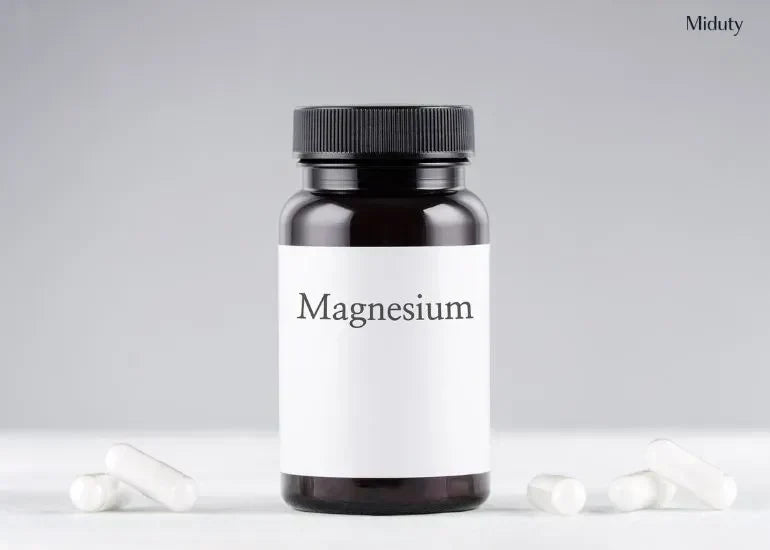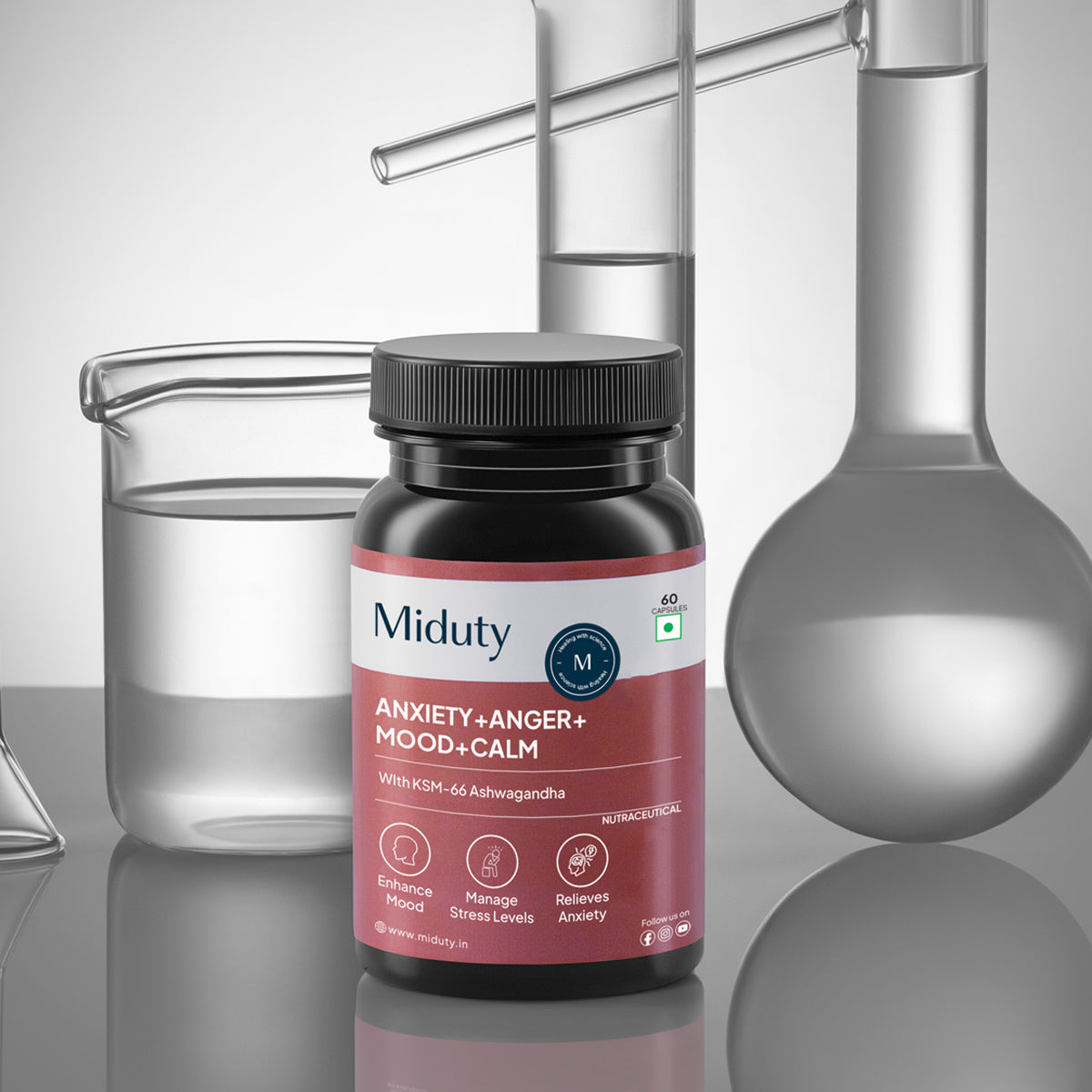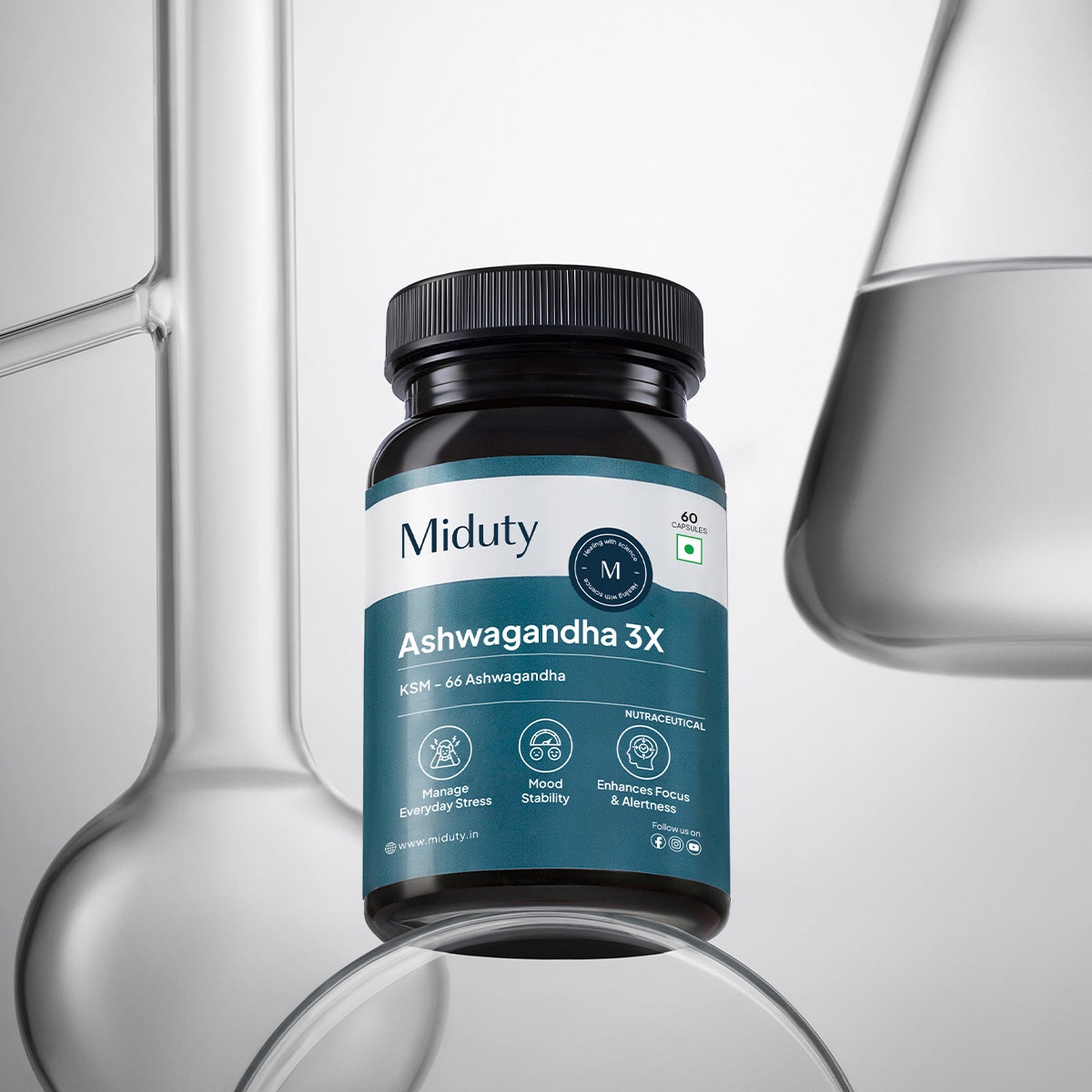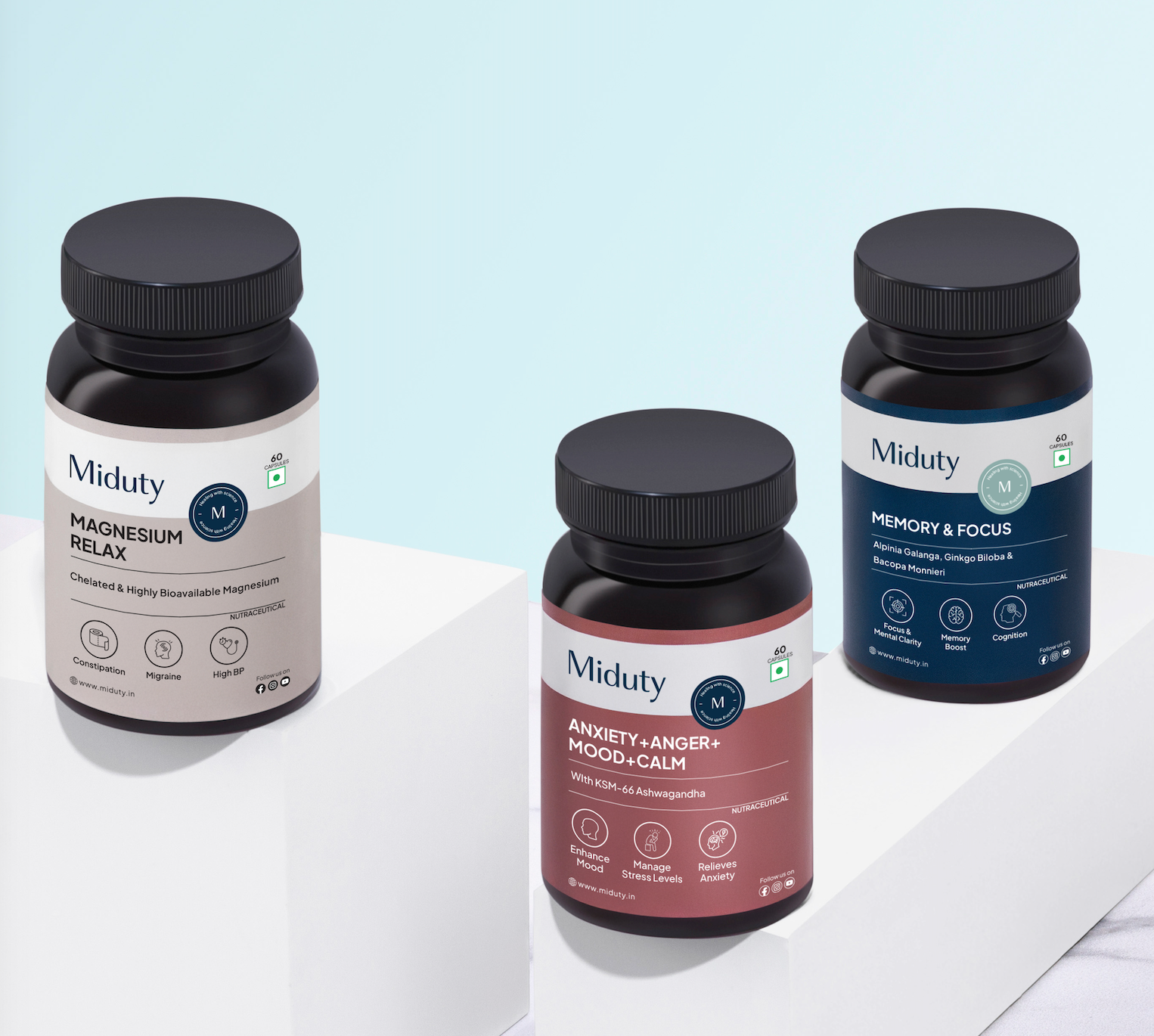
Which Type of Magnesium Supplement is Right for Your Deficiency Symptoms
Have you ever walked down the supplement aisle and felt completely lost looking at bottles labeled "magnesium citrate," "magnesium glycinate," "magnesium oxide," and so on? You're not alone. For most of us, magnesium is just that one mineral we occasionally hear about when someone mentions muscle cramps, sleep issues, or energy levels. But here's the truth, not all magnesium is the same.
Each type of magnesium affects the body a little differently, and choosing the right one can make the difference between feeling better or just wasting money on something your body doesn't absorb well. If you've been wondering which form is right for your needs, how to spot magnesium deficiency symptoms, and what to look for in supplements, this guide will clear it all up.
Key Takeaways
1. Not All Magnesium Is Created Equal. Different types of magnesium supplements work differently in the body, some support digestion, others benefit heart, brain, or sleep health. Choosing the right form is essential to see real results.
2. Magnesium Bisglycinate Is the Gold Standard. Among all forms, magnesium bisglycinate stands out for its excellent absorption, gentle effect on digestion, and calming properties. It's the best all-around choice for managing stress, improving sleep, and supporting muscle recovery.
3. Magnesium Deficiency Can Hide in Plain Sight.Symptoms like fatigue, anxiety, headaches, or muscle cramps may actually signal magnesium deficiency. Recognizing these early signs helps you restore balance before more serious problems develop.
4. Match the Magnesium to Your Goals. There's no one-size-fits-all supplement. Magnesium citrate helps relieve constipation, malate fights fatigue, taurate supports heart health, and L-threonate enhances brain function. Choose the form that best fits your needs.
5. Supplements Help But Lifestyle Comes First. Magnesium supplements work best alongside a nutrient-rich diet filled with greens, nuts, and whole foods. Consistency and balance matter far more than taking large doses.
Why Is Magnesium Important?
Magnesium is involved in more than 300 enzymatic processes in the body. It helps your muscles relax after they contract, keeps your heart rhythm steady, supports healthy blood pressure, strengthens bones, and even influences your mood and sleep quality.
Despite all that, studies suggest that a significant portion of the population doesn't get enough magnesium. Our modern diets, heavy on processed foods and light on leafy greens, legumes, and nuts — don't help. Add to that stress, caffeine, alcohol, or certain medications, and your magnesium levels can dip below what your body truly needs.
When that happens, you may experience subtle but frustrating magnesium deficiency symptoms: low energy, muscle cramps, restless nights, anxiety, or even heart palpitations. The tricky part? These signs often get dismissed or blamed on other causes.
Magnesium Deficiency Symptoms: What to Watch For
Magnesium deficiency, also called hypomagnesemia, can show up in different ways depending on how low your levels are. Here are some of the most common symptoms people notice:
1. Muscle cramps or twitches — that annoying flutter under your eye or tight calves after exercise.
2. Fatigue and weakness — even after sleeping well, you still feel drained.
3. Sleep issues — magnesium helps calm the nervous system and promotes melatonin production, so low levels can make it harder to fall or stay asleep.
4. Anxiety, irritability, or mood swings — low magnesium can interfere with brain chemicals that regulate mood.
5. Headaches or migraines — some studies link magnesium deficiency with increased migraine frequency.
6. Irregular heartbeat or palpitations — magnesium helps regulate heart rhythm.
7. Numbness, tingling, or muscle stiffness — especially in your hands or feet.
8. High blood pressure — because magnesium helps relax blood vessels, a deficiency can contribute to hypertension.
In more severe cases, magnesium deficiency can lead to tremors, seizures, or dangerous heart arrhythmias — though that's rare and usually linked to medical conditions or certain medications. [1]
If several of these sound familiar, it might be worth checking your magnesium levels or reviewing your diet and lifestyle to see where you could be falling short.
Why Does the Type of Magnesium Supplement Matters?
Once you decide to take magnesium, the next challenge appears: choosing the right type. Walk into any pharmacy or search online, and you'll see countless versions of magnesium supplements. The reason? Magnesium on its own doesn't absorb well, so it's bound to another substance — like citrate, glycinate, or oxide — to make it usable by your body.
That "other half" of the compound changes everything: how well it's absorbed, how your stomach tolerates it, and what specific benefits it provides. So, let's break down the most common types of magnesium supplements and what they actually do.
Different Types of Magnesium Supplements -
1. Magnesium Citrate
Magnesium citrate is one of the most popular and widely available forms. It's magnesium combined with citric acid, which helps with absorption.
It's often recommended for people who need a general magnesium boost or who occasionally deal with constipation. That's because it has a gentle laxative effect — not necessarily a bad thing if your digestion tends to be sluggish.
If you're looking for something well-absorbed and easy on the stomach (in small doses), magnesium citrate is a solid starting point. However, larger doses can sometimes cause loose stools, so moderation is key.
2. Magnesium Glycinate (Bisglycinate)
Among all types of magnesium supplements, magnesium glycinate, also known as magnesium bisglycinate — stands out as a favorite for everyday use. This form combines magnesium with the amino acid glycine, creating a compound that's both highly absorbable and incredibly gentle on the digestive system.
Unlike magnesium oxide or citrate, which can upset the stomach or cause loose stools, magnesium bisglycinate is well-tolerated even in higher doses. That's because the glycine molecules help "escort" magnesium across the intestinal wall more efficiently, leading to better absorption and fewer side effects.
But the benefits go beyond digestion. Glycine itself has calming effects on the brain and nervous system. Together with magnesium, it forms a powerful duo that promotes relaxation, reduces muscle tension, and supports deeper, more restorative sleep.
If you're someone who feels constantly tense, anxious, or mentally wired at night, a magnesium bisglycinate supplement might be the most effective choice. Many people take it before bed to unwind, sleep better, and wake up feeling refreshed — without the grogginess that comes from sleep medications.
Key Benefits of Magnesium Bisglycinate:
- Excellent absorption: One of the most bioavailable forms of magnesium, meaning more of it actually reaches your cells.
- Gentle digestion: Rarely causes diarrhea or cramping, making it suitable for people with sensitive stomachs.
- Supports sleep and relaxation: Helps calm the nervous system and regulate melatonin.
- May reduce anxiety and irritability: Glycine works synergistically with magnesium to balance mood.
- Good for long-term use: Safe for daily supplementation without the GI side effects of other forms. [2]
Because of its wide-ranging benefits and excellent tolerance, magnesium bisglycinate is often called the gold standard for magnesium supplementation. It's particularly well-suited for people managing stress, muscle tension, or sleep problems — and it's one of the few forms that truly works well for nearly everyone.
3. Magnesium Oxide
You'll find magnesium oxide in many cheap over-the-counter supplements, but there's a catch: it's not very well absorbed by the body. Even though it contains a high percentage of elemental magnesium, most of it passes through your digestive system unabsorbed.
That said, it can be useful for people dealing with occasional constipation, since it has a stronger laxative effect. Just don't rely on it for correcting deficiency — it's more of a digestive aid than a nutrient booster.
4. Magnesium Malate
This type pairs magnesium with malic acid, a compound found naturally in fruits like apples. Magnesium malate tends to be well absorbed and is known for providing a bit of an energy boost.
It's often recommended for people struggling with fatigue, fibromyalgia, or muscle pain. Because malic acid plays a role in the body's energy production cycle, this form of magnesium can help combat tiredness without being stimulating.
5. Magnesium Taurate
If heart health is your focus, magnesium taurate might be a good choice. It combines magnesium with taurine, an amino acid that supports heart rhythm and helps regulate blood pressure.
This type is easy on the digestive system and may have benefits for cardiovascular function, particularly in people with high blood pressure or those who experience palpitations. It's also less likely to cause laxative effects compared to some other forms.
6. Magnesium L-Threonate
Among the newer and more specialized forms, magnesium L-threonate stands out because it can cross the blood-brain barrier — meaning it directly affects the brain.
Preliminary research suggests it may help with cognitive function, memory, and mental clarity. That makes it popular among students, professionals, and older adults looking to maintain sharpness. It's more expensive than other forms, but if you're aiming to support brain health, it's worth considering.
7. Magnesium Chloride
Magnesium chloride offers good bioavailability and is commonly used in both oral and topical products (like magnesium oils and sprays). It's a versatile form that can help raise magnesium levels efficiently.
Topical magnesium chloride — used in sprays or bath flakes — can be helpful for muscle soreness or relaxation, especially when oral supplements upset your stomach. However, while topical use may provide localized relief, oral supplementation is still better for increasing whole-body magnesium.
8. Magnesium Sulfate
You probably know this one as Epsom salts. Magnesium sulfate is mainly used in baths to soothe sore muscles and promote relaxation. When dissolved in warm water, it's absorbed through the skin to some degree, making it great for athletes or anyone feeling physically tense.
Taken orally, however, it's a strong laxative and not ideal for long-term supplementation.
9. Magnesium Orotate
This less common form combines magnesium with orotic acid and is sometimes promoted for heart and athletic performance. Some evidence suggests it may help with cardiovascular function, but it tends to be pricier and less widely available.
If you're simply trying to correct a mild deficiency or improve sleep, other forms like bisglycinate or citrate are usually more practical choices.
How to Choose the Right Type of Magnesium Supplement?
With all these options, it's easy to feel overwhelmed. Here's a simple way to think about it:
| Purpose | Recommended Magnesium Form | Key Benefits |
| Constipation or Sluggish Digestion | Magnesium Citrate or Magnesium Oxide | Supports regular bowel movements and relieves occasional constipation. |
| Fatigue or Muscle Soreness | Magnesium Malate | Boosts energy production, reduces muscle cramps, and eases post-workout soreness. |
| Heart Health | Magnesium Taurate or Magnesium Orotate | Supports healthy heart rhythm, blood pressure balance, and overall cardiovascular health. |
| Brain Health and Focus | Magnesium L-Threonate | Enhances memory, learning, and cognitive performance by crossing the blood–brain barrier. |
| External Use and Relaxation Baths | Magnesium Chloride or Magnesium Sulfate (Epsom Salt) | Relaxes muscles, eases tension, and supports recovery when used in baths or topical applications. |
If you're unsure, magnesium bisglycinate is often the safest all-around choice — gentle, effective, and suitable for daily use.
A Few Supplement Tips
1. Start small. Begin with a lower dose and increase gradually to avoid digestive upset.
2. Take it consistently. Magnesium levels build up over time, so consistency matters more than high doses.
3. Pair it with meals. Taking magnesium with food can enhance absorption and reduce stomach discomfort.
4. Be mindful of interactions. Magnesium can interfere with some medications (like antibiotics or thyroid drugs), so take them at different times or consult your doctor.
5. Focus on diet too. Leafy greens, avocados, almonds, cashews, and beans are all magnesium-rich foods that help maintain balance naturally.
Conclusion
Choosing the right type of magnesium supplement isn't about following the latest trend — it's about understanding your body and what it needs most. Whether you're battling fatigue, restless sleep, muscle cramps, or anxiety, the right form of magnesium can make a noticeable difference.
Among all the forms, magnesium bisglycinate stands out for its balance of absorption, effectiveness, and gentleness. It's the one form that truly works well for most people, helping restore calm, improve sleep, and keep your muscles and mind in sync.
And remember, no supplement replaces a healthy lifestyle. Start with magnesium-rich foods, manage stress, stay hydrated, and use supplements as a tool — not a crutch. When used wisely, magnesium can truly live up to its nickname: the relaxation mineral.
FAQ's on Magnesium Supplements Types -
Q1 - What is the healthiest form of magnesium to take?
The best form of magnesium depends on what you're trying to improve. Each type has its own unique benefit — for example, Magnesium L-Threonate supports brain health, Magnesium Glycinate helps with sleep and relaxation, Magnesium Citrate is useful for relieving constipation, and Magnesium Malate can help with muscle pain and fatigue. Forms that are more easily absorbed by the body, such as magnesium aspartate, citrate, and glycinate, are generally considered more effective than less soluble types like magnesium oxide.
Q2 - Is it OK to take magnesium every night?
Yes, it's generally safe to take magnesium at night, especially if you're using it to support better sleep. Magnesium can help relax your muscles and calm your mind, which may improve sleep quality. However, it's important to stay within the recommended daily dosage and talk to your doctor before starting any supplement. Taking too much magnesium can cause side effects such as diarrhea, nausea, or, in rare cases, more serious problems like an irregular heartbeat.
Q3 - Which magnesium is best for sleep and anxiety?
For sleep and anxiety, magnesium glycinate is often the top choice because it's gentle on the stomach, well-absorbed, and has a naturally calming effect. Magnesium threonate is another excellent option, as it can cross the blood-brain barrier to directly support brain function, mood balance, and sleep quality. The best form of magnesium ultimately depends on your specific needs — for example, magnesium citrate works well for improving digestion, while magnesium chloride is helpful for quickly correcting magnesium deficiencies.
Q4 - Which magnesium is best for leg cramps and sleep?
For leg cramps and better sleep, magnesium glycinate is often recommended because it's well absorbed, gentle on the stomach, and helps relax both the body and mind. Its calming properties make it especially useful for easing muscle tension and improving sleep quality. Magnesium L-threonate is another great option for promoting relaxation and supporting brain health, while magnesium malate can be helpful for reducing muscle pain and fatigue.
Q5 - Should I take magnesium L threonate or glycinate?
Both magnesium L-threonate and magnesium glycinate are excellent choices, but they serve slightly different purposes. If you want to support brain health, focus, and memory, magnesium L-threonate is ideal because it can cross the blood-brain barrier. If your goal is better sleep, relaxation, or reducing anxiety and muscle tension, magnesium glycinate is usually the better option.
References
| Sr. No. | Reference Links |
| 1. | Magnesium Metabolism and its Disorders |
| 2. | Magnesium Glycinate |













